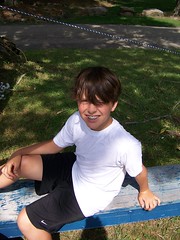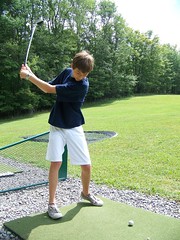In an earlier blog we wrote about how to judge whether or not your child is ready to go to camp and pointed out that it really depends on your unique child and their level of maturity. One mother, Christine, puts it this way, “each kid is different…each mum is different …so I do not feel I can really give blanket advice. . .” However, Christine’s 12 year-old son was ready to go to camp—so ready that last summer he came to Camp Weequahic from Switzerland and arrived without knowing a single other camper!
 Nicolas had mostly attended an international school and studied English in Switzerland, so his communication skills were well developed and he felt comfortable with the prospect of adjusting to a new culture. He had also previously visited the United States and after switching to Swiss school last year, his mother wanted him to retain his fluency in English, learn about American culture first hand, and make American friends. Christine says there are a number of American camps that promote their programs in Switzerland but she avoided their outreach since she “did not want to send Nicolas to the United States just to meet other French guys!!!”
Nicolas had mostly attended an international school and studied English in Switzerland, so his communication skills were well developed and he felt comfortable with the prospect of adjusting to a new culture. He had also previously visited the United States and after switching to Swiss school last year, his mother wanted him to retain his fluency in English, learn about American culture first hand, and make American friends. Christine says there are a number of American camps that promote their programs in Switzerland but she avoided their outreach since she “did not want to send Nicolas to the United States just to meet other French guys!!!”
Christine decided instead to look for a “really American camp” on the internet and spent a lot of time researching and comparing her options. What guided her final choice was the Camp Weequahic website with its video clips, and she was drawn to the camp’s obviously family atmosphere. After all, she was sending him a long way to try different things and have new experiences! Since Nicolas travelled from Europe, a three-week session seemed the perfect fit—two weeks seemed too short and four weeks seemed too long for a first time camp experience across the Atlantic.
Nicolas travelled to camp with his mother and then later flew back to Europe by himself after the Weequahic staff put him right on the plane at Newark Airport. (It’s also worth mentioning that each airline has its own rules about when and how children can fly alone.)
 Christine’s nieces both had a wonderful camp experience in the United States, but Christine felt that Nicolas would be more open to forging friendships and getting to know American kids, if he ventured on his own—and every mother understands that each child is different! Nicolas completely agreed about coming to camp on his own and since he was a little familiar with American culture and speaks English, that’s what worked for him.
Christine’s nieces both had a wonderful camp experience in the United States, but Christine felt that Nicolas would be more open to forging friendships and getting to know American kids, if he ventured on his own—and every mother understands that each child is different! Nicolas completely agreed about coming to camp on his own and since he was a little familiar with American culture and speaks English, that’s what worked for him.

In Geneva, Nicolas has developed friendships with students from all over the world and his mother’s commitment to raising a globally-aware child was well under way, but coming to the United States added a whole new level of intercultural awareness. For example, camp gave Nicolas time to develop deeper relationships with Americans his own age and broaden his knowledge about the game and traditions of baseball. He also experienced cultural details that a tourist might miss. Nicolas loved Camp Weequahic so much that he wants to return and is now dreaming of coming back as a CIT (Counselor in Training). His younger brother has also caught camp fever and wants his turn as a camper too!
No matter how many miles a camper literally travels to camp, the adventure stretches them in many ways and contributes to measurable personal development. Campers return changed from both travel and their personal journey–and in Nicolas’ case, even more fluent in American English! Have you sent your child on a long distance to camp? How did the experience help your child develop self-reliance and skills? How did you decide what your child could handle?
Thank you so much for sharing your story, Christine and Nicolas!
Deborah-Eve

